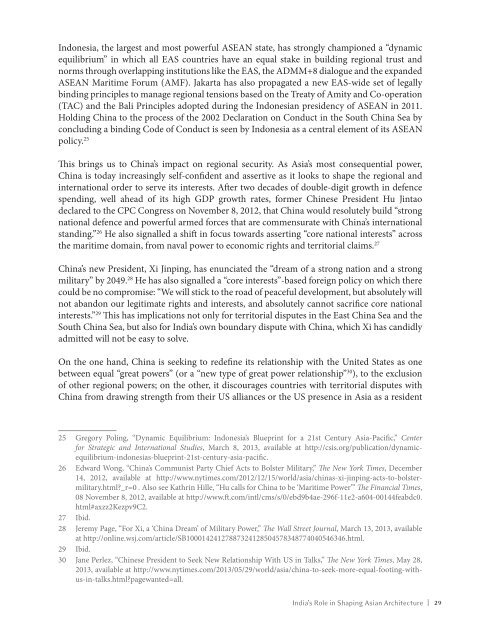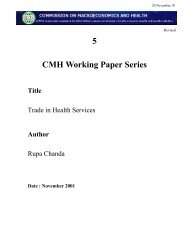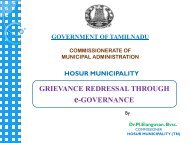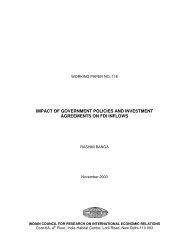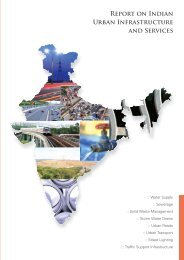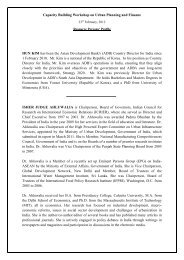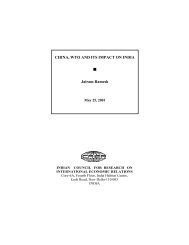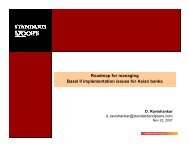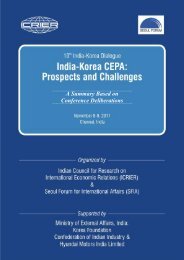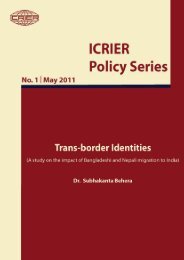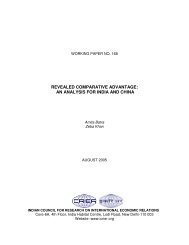Asia's Arc of Advantage - icrier
Asia's Arc of Advantage - icrier
Asia's Arc of Advantage - icrier
Create successful ePaper yourself
Turn your PDF publications into a flip-book with our unique Google optimized e-Paper software.
Indonesia, the largest and most powerful ASEAN state, has strongly championed a “dynamic<br />
equilibrium” in which all EAS countries have an equal stake in building regional trust and<br />
norms through overlapping institutions like the EAS, the ADMM+8 dialogue and the expanded<br />
ASEAN Maritime Forum (AMF). Jakarta has also propagated a new EAS-wide set <strong>of</strong> legally<br />
binding principles to manage regional tensions based on the Treaty <strong>of</strong> Amity and Co-operation<br />
(TAC) and the Bali Principles adopted during the Indonesian presidency <strong>of</strong> ASEAN in 2011.<br />
Holding China to the process <strong>of</strong> the 2002 Declaration on Conduct in the South China Sea by<br />
concluding a binding Code <strong>of</strong> Conduct is seen by Indonesia as a central element <strong>of</strong> its ASEAN<br />
policy. 25<br />
This brings us to China’s impact on regional security. As Asia’s most consequential power,<br />
China is today increasingly self-confident and assertive as it looks to shape the regional and<br />
international order to serve its interests. After two decades <strong>of</strong> double-digit growth in defence<br />
spending, well ahead <strong>of</strong> its high GDP growth rates, former Chinese President Hu Jintao<br />
declared to the CPC Congress on November 8, 2012, that China would resolutely build “strong<br />
national defence and powerful armed forces that are commensurate with China’s international<br />
standing.” 26 He also signalled a shift in focus towards asserting “core national interests” across<br />
the maritime domain, from naval power to economic rights and territorial claims. 27<br />
China’s new President, Xi Jinping, has enunciated the “dream <strong>of</strong> a strong nation and a strong<br />
military” by 2049. 28 He has also signalled a “core interests”-based foreign policy on which there<br />
could be no compromise: “We will stick to the road <strong>of</strong> peaceful development, but absolutely will<br />
not abandon our legitimate rights and interests, and absolutely cannot sacrifice core national<br />
interests.” 29 This has implications not only for territorial disputes in the East China Sea and the<br />
South China Sea, but also for India’s own boundary dispute with China, which Xi has candidly<br />
admitted will not be easy to solve.<br />
On the one hand, China is seeking to redefine its relationship with the United States as one<br />
between equal “great powers” (or a “new type <strong>of</strong> great power relationship” 30 ), to the exclusion<br />
<strong>of</strong> other regional powers; on the other, it discourages countries with territorial disputes with<br />
China from drawing strength from their US alliances or the US presence in Asia as a resident<br />
25 Gregory Poling, “Dynamic Equilibrium: Indonesia’s Blueprint for a 21st Century Asia-Pacific,” Center<br />
for Strategic and International Studies, March 8, 2013, available at http://csis.org/publication/dynamicequilibrium-indonesias-blueprint-21st-century-asia-pacific.<br />
26 Edward Wong, “China’s Communist Party Chief Acts to Bolster Military,” The New York Times, December<br />
14, 2012, available at http://www.nytimes.com/2012/12/15/world/asia/chinas-xi-jinping-acts-to-bolstermilitary.html?_r=0<br />
. Also see Kathrin Hille, “Hu calls for China to be ‘Maritime Power’” The Financial Times,<br />
08 November 8, 2012, available at http://www.ft.com/intl/cms/s/0/ebd9b4ae-296f-11e2-a604-00144feabdc0.<br />
html#axzz2Kezpv9C2.<br />
27 Ibid.<br />
28 Jeremy Page, “For Xi, a ‘China Dream’ <strong>of</strong> Military Power,” The Wall Street Journal, March 13, 2013, available<br />
at http://online.wsj.com/article/SB10001424127887324128504578348774040546346.html.<br />
29 Ibid.<br />
30 Jane Perlez, “Chinese President to Seek New Relationship With US in Talks,” The New York Times, May 28,<br />
2013, available at http://www.nytimes.com/2013/05/29/world/asia/china-to-seek-more-equal-footing-withus-in-talks.html?pagewanted=all.<br />
India’s Role in Shaping Asian <strong>Arc</strong>hitecture | 29


